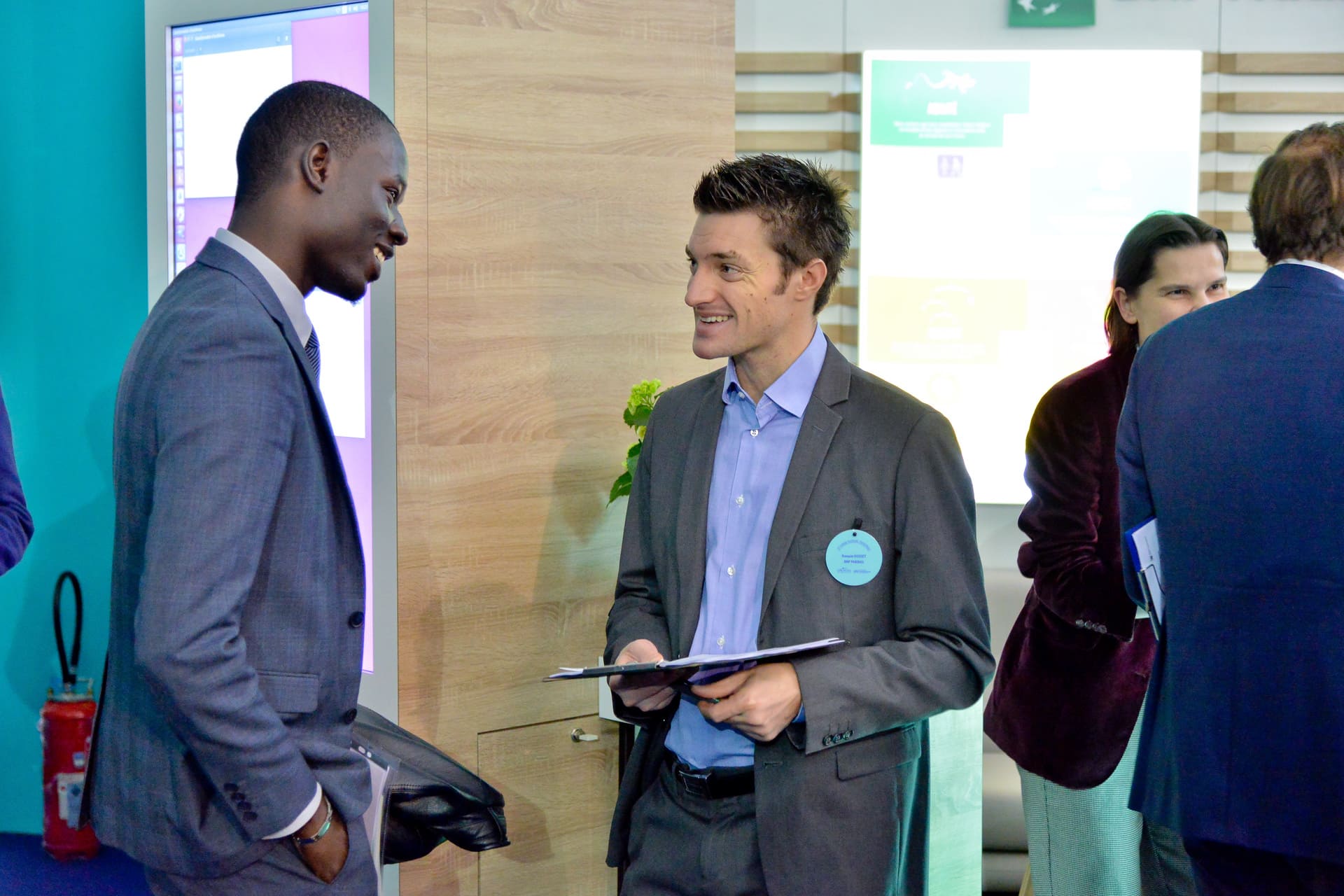Syllabus
Obligatoire
- Méthodes quantitatives pour la finance
Méthodes quantitatives pour la finance
Ects : 3
Lecturer :
Total hours : 18
Overview :
1. Propriétés statistiques des rendements financiers
2. Construction de portefeuilles et optimalité
3. Asset pricing et CAPM
4. Evaluation des produits dérivés – temps discret
5. Evaluation des produits dérivés – temps continu
Coefficient : 1
Recommended prerequisites :
- Statistiques : estimation, théorie des tests
- Théorie financière : allocation de portefeuilles, modèles d'évaluation d'actifs, produits dérivés
- Algèbre linéaire : vecteurs, matrices
Learning outcomes :
Maîtrise des concepts théoriques et empiriques des modèles d'évaluation d'actifs financiers
Assessment :
QCM
- Audit et contrôle interne
Audit et contrôle interne
Ects : 3
Total hours : 24
Overview :
Contrôle interne, risque opérationnel, conformité, audit Comprendre le contrôle interne et savoir l'auditer
Coefficient : 1
Learning outcomes :
Analyse des déterminants du contrôle interne
- IFRS et évaluation d'actifs et passifs
IFRS et évaluation d'actifs et passifs
Ects : 3
Lecturer :
Total hours : 24
Overview :
1) Aspects institutionnels et politiques de normalisation internationale du reporting financier
2) Principales normes sur les actifs et passifs : IAS 16, IAS 38, IAS 17 vs. IFRS 16 et IAS 37 / Retranscription en référentiel French GAAPs
3) Business combination en IFRS 3R et reporting de la juste valeur IFRS 13
4) Tests d’impairment en IAS 36 et enjeux dans les contrats de location IFRS 16
5) Valorisation et classification des instruments financiers en IAS 32-39 et IFRS 7-9
6) Paiements en actions et option-pricing en IFRS 2
7) Engagements de retraite en IAS 19R
Coefficient : 1
Recommended prerequisites :
Evaluation financière, finance d'entreprise, comptabilité et reporting
Learning outcomes :
Maîtrise des concepts clés d'évaluation en IFRS
Assessment :
Notes d’analyse et exposés (30%) ; Examen final (70%)
Bibliography-recommended reading
Ramond, O., Paugam, L., Casta, J.-F., et Batsch, L. (2017). Evaluation financière et normes IFRS, 2ème édition, éd. Economica, 192p.
Raffournier B. (2021), Les normes comptables internationales : IFRS/IAS, 8ème éd., éd. Economica, 614p.
Code IFRS : normes et interprétations, Groupe Revue Fiduciaire, 2024.
Sites de doctrine des grands cabinets
- Audit des systèmes d'information
Audit des systèmes d'information
Ects : 3
Lecturer :
- SYLVAIN BUREAU
Total hours : 24
Overview :
SI, audit Comprendre et savoir mettre en oeuvre les principes d'audit des systèmes d'information
Coefficient : 1
Learning outcomes :
Maîtriser les enjeux de l'audit SI
- Comptabilité des groupes approfondie
Comptabilité des groupes approfondie
Total hours : 12
Overview :
Consolidation, reporting des groupes Comprendre les méthodes de consolidation et les principales techniques de reporting des groupes
Coefficient : 1
Learning outcomes :
Maîtrise des normes et méthodes clés de consolidation des groupes
- Atelier d'insertion professionnelle
Atelier d'insertion professionnelle
Ects : 3
Lecturer :
Total hours : 24
Overview :
Insertion professionnelle, techniques d'entretien, tests écrits Etre capable de s'insérer professionnellement en grands cabinets en réalisant les tests écrits et oraux
Coefficient : 1
Learning outcomes :
L'étudiant sera en mesure de mieux appréhender le processus de sélection en cabinets d'audit et de conseil
- Financial instruments and derivatives
Financial instruments and derivatives
Ects : 3
Lecturer :
Total hours : 24
Overview :
This course covers the analysis of derivative instruments such as forwards, futures, swaps and options. By the end of the course, students will have good knowledge of how these contracts work, how they are used and how they are priced. A particular attention will be given to the analysis of employee stock options.
Coefficient : 1
Learning outcomes :
- Be able to describe and explain the fundamental features of a range of key financial derivative instruments
- Be able to decide which securities companies should use for hedging and/or speculative purposes
- Understand the no-arbitrage principle and its role in pricing financial forwards and futures
- Understand the binomial approach in pricing European and American options
- Understand the Black-Scholes option formula for the price of a European option
- Understand how to price employee stock options
Assessment :
Midterm exam (40% of the final grade) and Final exam (60% of the final grade).
Bibliography-recommended reading
- Options, Futures, and Other Derivatives, 11th Edition, Hull, John C., Pearson-Prentice Hall (2021). - Student Solutions Manual for Options, Futures, and Other Derivatives, 11th Edition, Hull, John C., Pearson-Prentice Hall (2021).
- Méthodologie de l'audit financier
Méthodologie de l'audit financier
Ects : 3
Lecturer :
- Jerome-Eric GRAS
Total hours : 21
Overview :
Méthodologie de l'audit, contrôle des risques Permettre aux étudiants de comprendre la méthodologie de l'audit légal
Coefficient : 1
Learning outcomes :
Maîtrise de la méthode d'audit implémentée en grands cabinets
- Structuring & opérations financières complexes
Structuring & opérations financières complexes
Ects : 3
Total hours : 24
Overview :
Effet de levier, analyse des opérations de LBO et M&A, opérations de haut de bilan Donner aux étudiants les principes de structuration d'une opération financière à effet de levier ou de haut de bilan
Coefficient : 1
Learning outcomes :
Maîtrise des opérations à effet de levier et de haut de bilan
- Equity investment
Equity investment
Ects : 3
Lecturer :
- JEAN-FRANCOIS BOUILLY
Total hours : 15
Overview :
Financing, investments, subsidiaries equities portfolio Acquaint students with advanced topics in subsidiaries equities portfolio management
Coefficient : 1
Learning outcomes :
Master theoretical concepts of subsidiaries portfolio management
- Audit fiscal des grands groupes
Audit fiscal des grands groupes
Ects : 3
Lecturer :
Total hours : 12
Overview :
Fiscalité des opérations de cessions / acquisions, fiscalité des groupes, fiscalité des restructurations Familiariser les étudiants avec les grands principes qui régissent la fiscalité des entreprises et des groupes de sociétés pour ensuite les sensibiliser aux principales problématiques fiscales rencontrées lors de la réalisation d’opérations transactionnelles
Coefficient : 1
Learning outcomes :
Compréhension des problématiques fiscales rencontrées sur des opérations de fusions-acquisitions
- Crash course evaluation
Crash course evaluation
Lecturer :
Total hours : 15
Overview :
1. Démarche générale d'évaluation
2. Structure financière, taux de rendement et répartition de la valeur actionnariale
3. Introduction aux options réelles
Coefficient : 1
Recommended prerequisites :
Mathématiques financières Comptabilité des groupes Méthodes d'évaluation
Require prerequisites :
Mathématiques financières
Comptabilité des groupes
Méthodes d'évaluation
Learning outcomes :
- Capacité d’analyse critique des états financiers et de l'information comptable et financière
- Capacité de formulation d’un diagnostic
- Fondamentaux de l'évaluation d'entreprise
Bibliography-recommended reading
Vernimmen, P., Le Fur, Y. et P. Quiry. (2022). Finance d’entreprise, 21ème édition, éd. Dalloz, 1200p.
Penman S. (2012). Financial Statement Analysis and Security Valuation, 5ème éd., éd. McGraw-Hill, 768p.
Damodaran, A. (2006). Damodaran on Valuation: Security Analysis for Investment and Corporate Finance, 2ème éd., éd. Wiley Finance, 696p.
Obligatoire
- Due diligence d'acquisition
Due diligence d'acquisition
Ects : 3
Lecturer :
- SAMI TRITAR
Total hours : 24
Overview :
Réalisation d'une due diligence d'acquisition Etre capable de discuter un business plan, de réaliser un diagnostic stratégique et mettre en œuvre ces compétences dans le cadre d'une mission de conseil en acquisition d'entreprise
Coefficient : 1
Learning outcomes :
Analyse globale d'une entreprise et conseil aux dirigeants
- Audit interne et gouvernance
Audit interne et gouvernance
Ects : 3
Lecturer :
- ALEXANDRE DARDIGNA
Total hours : 18
Overview :
Audit interne, gouvernance d'entreprise Comprendre et savoir mettre en oeuvre les principes d'audit interne et de gouvernance d'entreprise
Coefficient : 1
Learning outcomes :
Maîtriser les enjeux de l'audit interne et du gouvernement d'entreprise
- Data & Analytics
Data & Analytics
Ects : 3
Lecturer :
Total hours : 24
Overview :
Data management Acquaint students with data & analytics issues
Coefficient : 1
Learning outcomes :
Master data& analytics principles
- Audit bancaire et risque de blanchiment
Audit bancaire et risque de blanchiment
Ects : 3
Total hours : 12
Overview :
Audit bancaire Comprendre et savoir mettre en oeuvre les principes d'audit dans le secteur bancaire
Coefficient : 1
Learning outcomes :
Maîtriser les enjeux de l'audit dans le secteur bancaire
- Risque pénal et déontologie du commissaire aux comptes
Risque pénal et déontologie du commissaire aux comptes
Ects : 3
Lecturer :
Total hours : 18
Overview :
Restructuration, levée de capitaux, gestion de la dette Comprendre et savoir mettre en oeuvre les principes de restructuring du capital des grandes entreprises
Coefficient : 1
Learning outcomes :
Maîtriser les enjeux des restructurations de capitaux en grandes entreprises
- Comptabilité des groupes approfondie
Comptabilité des groupes approfondie
Ects : 3
Total hours : 12
Overview :
Consolidation, reporting des groupes Comprendre les méthodes de consolidation et les principales techniques de reporting des groupes
Coefficient : 1
Learning outcomes :
Maîtrise des normes et méthodes clés de consolidation des groupes
- Stage d'audit / méthodologie de mémoire
Stage d'audit / méthodologie de mémoire
Ects : 6
Lecturer :
Total hours : 9
Overview :
Choix d’un sujet et organisation du travail de mémoire, Identification d’une problématique et structuration d’un raisonnement analytique et démonstratif, Restitution d’un raisonnement et détermination de conclusions
Coefficient : 1
Learning outcomes :
Choix d’un sujet et organisation du travail de mémoire, Identification d’une problématique et structuration d’un raisonnement analytique et démonstratif, Restitution d’un raisonnement et détermination de conclusions
Assessment :
Mémoire à rendre
- Audit juridique
Audit juridique
Ects : 3
Lecturer :
Total hours : 24
Overview :
L'enseignement s'articule autour de deux thèmes : - Les grands contrats de la société (statuts, pactes extrastatutaires, conventions réglementées), - La responsabilité sociétale des entreprises (organisation et performance sociétales, prévention des risques). Le cadre de la grande entreprise capitaliste est privilégié pour l'étude de ces deux thèmes.
Coefficient : 1
Learning outcomes :
- Compréhension de la réalité juridique des sociétés et des groupes de sociétés. - Compréhension de la place des sociétés dans l'économie française et européenne. - Compréhension de quelques grands principes juridiques appliqués à la vie des sociétés (liberté contractuelle, responsabilité individuelle). - Maîtrise du raisonnement juridique.
Assessment :
Contrôle continu
Bibliography-recommended reading
Maurice Cozian, Alain Viandier et Florence Deboissy, Droit des sociétés, 38ème éd., LexisNexis, 2025.
- Applied corporate finance
Applied corporate finance
Ects : 3
Lecturer :
- Luis MEZA GARCIA
Total hours : 24
Coefficient : 1
Academic Training Year 2025 - 2026 - subject to modification
Teaching Modalities
The program consists of around 450 hours of courses, spread out over seven months. About one third of instruction is taught in English.
Active pedagogy is central to the program, a combination of courses, tutorials, and plentiful group work.
The group work features real business cases and their relationship to the fundamentals of auditing and financial advising (fair value measurement of stocks and shares, auditing forecast data, appreciation and evaluation of stock options, internal control reviews) leads students to be actively engaged in the program's course content.
Internships and Supervised Projects
Students must complete a 12-week internship between January and March.
This pre-recruitment internship is an integral part of the pedagogical and vocational approach of the program. Assistance with finding an internship at an international audit firm is provided. The internship covers the activities characteristic of an auditing or financial advising assignment. It begins in January and lasts 12 weeks, during which time the student will be given projects to complete, supervised, and regularly evaluated.
At the end of the engagement, the recruitment associate presents an evaluation of the student's contributions to various projects to the director and student. The final review influences the likelihood that students will be offered permanent positions after they complete the Master's degree (every year, over 95% are).
Research-driven Programs
Training courses are developed in close collaboration with Dauphine's world-class research programs, which ensure high standards and innovation.
Research is organized around 6 disciplines all centered on the sciences of organizations and decision making.
Learn more about research at Dauphine


